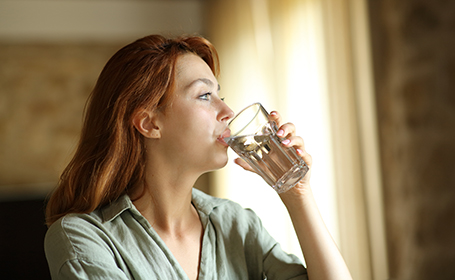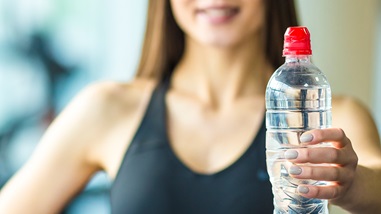
Why drinking water is so important for your kidneys
We talk about the importance of staying hydrated and how increasing your water intake can help to prevent kidney stones and urinary tract infections
But did you know that most of us don’t drink the recommended amount to stay healthy and avoid kidney problems?
We take a look at the role our kidneys have in keeping us healthy, the guidelines for a healthy fluid intake, and share some tips on how to up your water intake.
What do my kidneys do?

Your kidneys filter your blood to remove waste products and excess fluid, as well as regulate the levels of salt, potassium and acid in your body.
They also produce hormones that regulate your blood pressure and control the production of red blood cells.
Staying hydrated keeps your blood vessels open so oxygen and nutrients can travel freely to the organs that need them, including your kidneys.
Advice for urinary tract infections
If you've ever had a urinary tract infection (UTI) you'll be all too aware of the painful symptoms they cause, such as painful urination and a frequent urge to empty your bladder.
What is a urinary tract infection?
Although a UTI can’t always be prevented, drinking plenty of water can help to prevent recurring infections. One study found that women who consumed an additional three pints of water a day were almost half as likely to get a UTI then woman who didn’t.
Men can get UTI, however they are more common in women because the urethra is shorter which makes it easier for bacteria to travel into the bladder.
Untreated UTIs can result in infection 'ascending' to the kidneys resulting in a severe kidney infection (pyelonephritis). This normally needs an admission to hospital for prompt intravenous antibiotics.
Treatment with antibiotics is usually required, although recurrent treatment runs the risk of antibiotic resistance, hence the need for conservative preventative measures. These include wiping front to back and urinating before and after intercourse in women. Men with recurring infection should also be investigated and treated, if needed, for prostate disease.
Recurrent UTIs in women (two proven infections in six months or three in a year) and a single UTI in men should be investigated by an urologist.
If you do develop a UTI and are prescribed antibiotics, drinking water is also really important as it helps to dissolve the antibiotics and makes them more effective. Drinking enough water also produces more urine, which helps to flush out infection-causing bacteria.
Around 20% of women will have more than one UTI in their lifetime
Risk factors for UTIs
- Women in their 20s and post-menopausal woman - around 20% of women will have more than one UTI in their lifetime
- Men with bladder outlet obstruction/enlarged prostates – this can result in difficulty in emptying their bladders
- Diabetes – the condition can make people predisposed to infections
- Not wiping front to back – this can push bacteria into the bladder
- Having sexual intercourse – this can also push bacteria from the back passage into the bloodstream
- Holding in urine – bacteria is more likely to sit and multiply which can cause a UTI
- Not fully emptying the bladder – this can also cause bacteria in the bladder to multiply
- Catheters – germs can travel along your urinary tract and cause an infection

Advice for kidney stones
Kidney stones can be unbearably painful, so if you've ever had one, the chances are you'll want to avoid another.
How do kidney stones form?
Kidney stones form when there is an excess of waste material, salt or minerals in the kidneys, which clump together to form ‘stones’. Some stones will go undetected and pass out painlessly in the urine, but they can move out of the kidney, become stuck and cause a blockage to the kidney, which can be very dangerous as well as very painful.
If you've had a kidney stone before, there is a 50% chance you'll develop another within 10 years. However, they are less likely to form if there is plenty of fluid in your urinary system as extra water helps to dilute as many mineral salts that cause stones.
Many cases of kidney stones can be treated without surgery. However, larger kidney stones may need to be broken up using shock waves. In some cases, keyhole surgery is needed to remove the kidney stone directly with laser treatment or ultrasound.
Staying hydrated is one of the most effective ways to prevent further kidney stones. All stone formers should drink plenty of fluids (particularly water), so that their urine is diluted to lower the risk of crystal and stone formation.
Risk factors for kidney stones
- Family history - some people are genetically more prone to forming stones
- Pre-existing conditions, such as diabetes
- Dehydration – not drinking enough water can increase your risk of kidney stones, as well as caffeine and alcohol
- Diet – diets rich in saturated fat, animal protein, refined sugar and salt (e.g. processed foods) can increase the risk of crystals forming in the kidney which can join together and form stones.
- Being overweight or obese – this can also increase your chance of developing kidney stones
The role of water in preventing further infections
The most important thing you can do to prevent further infections is to simply drink more water.
You should drink enough to produce 2-2 ½ litres of urine every day. This is a lot of fluid, however drinking continuously throughout the day, rather than drinking lots all at once, can make it more achievable. Increased water intake will help to flush out stone crystals and bacteria from the urinary tract.
Drinking fresh lemon or orange juice can also be helpful as the increase in citrate and alkaline levels in the urine can prevent most types of stones e.g. calcium oxalate and urate (although not kidney stones as a result of infection).
Of all the measures you can take to prevent further infections, simply drinking water - whether plain tap water, sparking bottled, or flavoured diluting juice is one of the simplest, cheapest, and most effective.
How do I know if I’m drinking enough water?
When you drink enough fluids your urine should be light yellow or colourless and odourless. If you're not drinking enough water, your urine will be darker and have a stronger odour.
It's often recommended to drink eight glasses of water a day. However, this is just a general rule and everyone is different.
If it's particularly hot or if you're exercising regularly, you'll need extra water to replenish what you lose through sweating. Isotonic sports drinks can help you hydrate faster during or after strenuous, lengthy exercise, but shouldn’t be a replacement for water.
In terms of preventing UTIs, drinking more fluids increases the rate of flushing bacteria from the bladder (“peeing them out” and emptying the bladder), and in doing so reduces the concentration of bacteria that remain in the bladder. This reduces the opportunities for bacteria to multiply and attach to cells that line the bladder which can cause subsequent inflammation of the bladder (“cystitis”) and symptoms.
Of all the measures you can take to prevent further infections, simply drinking water - whether plain tap water, sparking bottled, or flavoured diluting juice is one of the simplest, cheapest, and most effective.
Tags
How do I book an appointment?
If you're concerned about symptoms you're experiencing or require further information on this subject, talk to a GP or see an expert consultant at your local Circle Hospital.